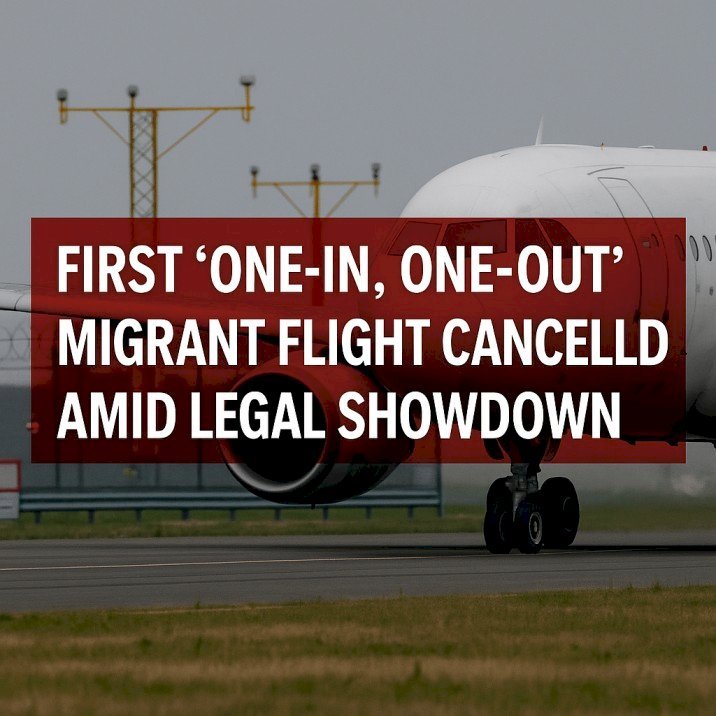First ‘One-In, One-Out’ Migrant Flight Cancelled Amid Legal Showdown
The UK’s first ‘one-in, one-out’ migrant deportation flight was cancelled after legal challenges, sparking political backlash and raising doubts over Labour’s policy.

The UK’s first “one-in, one-out” migrant deportation flight was cancelled at the last minute after urgent legal challenges and protests. The setback has sparked political backlash, drawn comparisons to the failed Rwanda scheme, and left dozens of asylum seekers in limbo as the government vows to press ahead.
London, September 16, 2025 — What was meant to be the UK government’s first demonstration of its flagship “one-in, one-out” migration policy instead collapsed into political turmoil. On Monday, the inaugural deportation flight to France was abruptly cancelled after legal challenges from migrant charities, igniting fierce debate and uncomfortable comparisons to the Conservatives’ failed Rwanda plan.
The cancellation has left ministers scrambling, activists celebrating a reprieve, and critics questioning whether Prime Minister Sir Keir Starmer’s approach to Channel migration can withstand its first serious test.
The “one-in, one-out” deal was presented in July during French President Emmanuel Macron’s state visit as a pragmatic compromise to stem Channel crossings, which have already reached more than 31,000 this year — a 48% increase on 2024. Under the scheme, asylum seekers arriving by small boats would be returned to France, while the UK would accept an equal number of refugees through safe and legal routes.
The government hailed the policy as both “pragmatic and humane,” with Starmer arguing it would deter dangerous journeys and dismantle smuggling networks while easing the burden on Kent and other border communities. But the abrupt cancellation of the first flight shows how fragile the plan may be.
The Home Office had quietly prepared the operation, intending to return a small group of migrants from Heathrow to Paris. The Guardian reported that officials had selected several Eritrean nationals, a group that accounts for a significant share of Channel arrivals.
Hours before departure, however, lawyers from Refugee Legal Support and Migrant Justice UK lodged urgent appeals. They argued that many Eritreans have asylum success rates above 80% in the UK, and blanket returns risk violating international protections. Within hours, the flight was grounded and a second planned departure the same day was also abandoned.
The Home Office said the cancellations were due to “ongoing legal proceedings” and “operational challenges,” pointing to a recent court ruling on inadequate deportation notice periods. ITV News reported that the government still intends to press ahead with removals “as soon as possible.”
For many observers, it was a déjà vu moment. Just two years ago, Rwanda flights were similarly blocked at the last minute by domestic and European courts, and critics warn Labour has stepped into the same legal quagmire.
“This is history repeating itself,” said Dr. Louise Green, a migration law expert at King’s College London. “Without watertight legal preparation, any deportation plan will face challenge after challenge.”
Rights groups welcomed the cancellation. “This scheme treats vulnerable people as pawns in a political game,” said Sarah Thompson of Migrant Justice UK. “Asylum seekers deserve individual assessments, not arbitrary returns.”
Conservative MPs seized on the chaos. “This is yet another display of Labour’s inability to deliver on migration control,” said Tory MP Daniel Harper. “The government promised firm action but failed at the very first hurdle.”
The Home Office struck a defiant note. “We remain fully committed to the one-in, one-out scheme and will resume flights as soon as legal obstacles are resolved,” a spokesperson said in a statement published on gov.uk. Starmer’s allies insist the plan remains the most workable alternative to Rwanda, though they acknowledge it could face months of courtroom battles.
In Kent, where local councils are struggling to cope with tens of thousands of arrivals, officials warned of growing pressure. “Every delay adds pressure on our resources,” a council spokesperson said. “We need clarity and action.”
Internationally, France has yet to issue a formal response. But European observers in Italy and Spain have already voiced scepticism about whether the scheme can survive relentless legal challenges.
The government’s ambitions were modest compared with Rwanda. Officials aimed to return around 50 migrants per week, far fewer than the 31,000 who have already crossed this year. Even so, that target looks difficult. Around 90 asylum seekers detained since August remain in limbo in facilities across southern England, waiting to see if they will be on the next flight.
Downing Street insists rescheduled flights will go ahead “as soon as possible,” though no new date has been set. Analysts predict protracted legal battles, with campaigners likely to challenge each deportation attempt.
For now, crossings across the Channel continue to rise, leaving Labour under pressure to prove its “one-in, one-out” migration strategy can deliver results. The first flight may have been grounded, but the political storm it unleashed is only beginning.




























